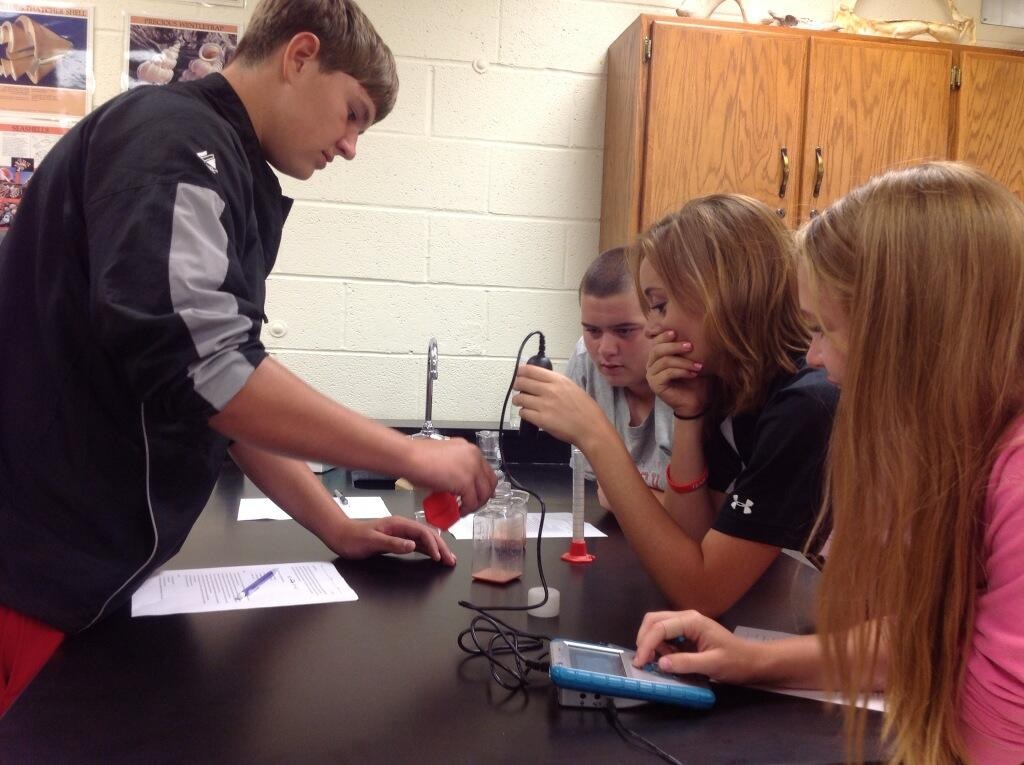Potatoes
The first inquiry project that we did was about potatoes. We were studying the scientific method and I wanted my students to practice designing an experiment so I made up a scenario about potatoes sprouting. I said that potatoes on the counter sprout but the ones in the fridge do not. Each of my classes came up with a reason why they don't sprout in the fridge and designed an experiment to test it. Then I thought to myself, if these guys are going through all the work of designing an experiment, why not actually do it. 20 pounds of potatoes later, my classes have 3 potatoes inquiry projects currently underway.
 This picture is from by third class who chose to test how the amount of moisture affects potato sprouts. The first set of potatoes is the control group with no water added, the second set is set on a piece of fabric that is kept moist and the last is a set of potatoes completely submerged in water. (An interesting side note about the second group is that the fabric is a pair of pants from a mannequin because that was the only fabric I had on hand...Lets just say the mannequin was much more realistic then I thought. My poor sophomores are scarred for life)
This picture is from by third class who chose to test how the amount of moisture affects potato sprouts. The first set of potatoes is the control group with no water added, the second set is set on a piece of fabric that is kept moist and the last is a set of potatoes completely submerged in water. (An interesting side note about the second group is that the fabric is a pair of pants from a mannequin because that was the only fabric I had on hand...Lets just say the mannequin was much more realistic then I thought. My poor sophomores are scarred for life) The class thought the one with the most water would grow the best but they are starting to disintegrate in the water. One of the potatoes on the counter is the first to start growing sprouts after only one week, but we will see if the group I'm backing (slightly moist) can make a comeback in the weeks to come. One of the nice things about this inquiry project is that it shows the students how easy it is to do an inquiry project. It doesn't have to be a huge ordeal, science can be quick, fun, and easy!
The class thought the one with the most water would grow the best but they are starting to disintegrate in the water. One of the potatoes on the counter is the first to start growing sprouts after only one week, but we will see if the group I'm backing (slightly moist) can make a comeback in the weeks to come. One of the nice things about this inquiry project is that it shows the students how easy it is to do an inquiry project. It doesn't have to be a huge ordeal, science can be quick, fun, and easy!Chicken Liver
A lab activity we will be doing tomorrow also has a little bit of inquiry involved. We are studying proteins and one of the most important functions of proteins is to be an enzyme. My sophomores, however, seem to have no idea about enzymes even though they are so important. We are going to do a lab where catalase (obtained from chicken liver) is mixed with hydrogen peroxide to make oxygen and water. We use a LabQuest oxygen probe to measure how much oxygen is being made. This is a pretty straight forward lab, but I want my students to do more than follow directions. I want them to question why and use the scientific method to get answers. My challenge for them is to find a way to make it happen faster. Their ideas are usually add more liver, add more hydrogen peroxide or make it hotter. With a little prodding they can also come up with changing the pH.This is an easy way for me to change a "follow directions lab" into an inquiry project. (I'll add pictures from class after they do it tomorrow.)

Plant Growth
The largest and most complex inquiry project we do is our plant project. The objective is extremely easy: find a way to help plants grow better. First the students research what plants need to grow, especially what nutrients. Once they have that figured out, they research common household items that occasionally get thrown away that have those nutrients and might help the plants grow. Then they design an experiment to test that household item. My students have tested many things ranging from coffee (helps) to orange juice(nothing grows), from milk (no growth) to Gatorade (growth), from aspirin (no growth) to toothpaste (no growth). They plant the seeds (I have used Wisconsin fast plants in the past but am trying radishes this year) water it, and track growth for about a month. Then they share their findings by writing a scientific paper. (I'll blog about the challenges relating to that later.)





